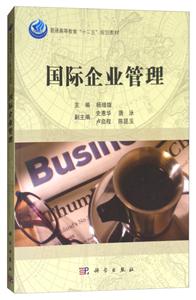
作者:杨海儒
页数:186
出版社:上海三联书店
出版日期:2015
ISBN:9787542652287
电子书格式:pdf/epub/txt
内容简介
This study aims to explore what is the motivation of international entrepreneurship in the domestic market and how international entrepreneurial firms survive in foreign market. Based on a sample of 212 Chinese international firms, it examines the internationalization of organizational field as an antecedent of international entrepreneurship from a neoinstitutional theory perspective. Exploitative and exploratory learning are considered as consequences of international entrepreneurship, because firms seek to achieve legitimacy in the host country. The nonlinear relationship between exploitative and exploratory learning and performance are further tested.Findings suggest that isomorphic pressurefrom the organizational field will cause firms to engagein international entrepreneurial activities. In order to get legitimacy in ahost country, international entrepreneurship, in turn, is positively associated with the above two learning processes. Results also support that although exploitative and exploratory learning are beneficial, they would weaken a firm’s performance in a foreign market, after a certain point.
作者简介
1978年出生,天津人。于2010年获得香港城市大学市场营销专业博士学位。现任上海金融学院工商管理系副教授。
本书特色
杨海儒编著的《国际企业家精神与合法化》介绍:This study aims to explore what is the motivation of international entrepre neurship in the domestic market and how international entrepreneurial firms survive in foreign market. Based on a sample of 212 Chinese international firms, it examines the internationalization of organizational field as an antecedent of international entrepreneurship from a neoinstitutional theory perspective. Exploitative and exploratory learning are considered as conse quences of international entrepreneurship, because firms seek to achieve legitimacy in the host country. The nonlinear relationship between exploit ative and exploratory learning and performance are further tested.Findings suggest that isomorphic pressurefrom the organizational field will cause firms to engagein international entrepreneurial activities.
目录
ABSTRACTList of TableList of FigureChapter 1 Introduction1.1 International Entrepreneurship —— a Brief Review1.2 Research Questions1.3 Research Settings1.4 Research Methodology1.5 Outline of the Study1.6Chapter SummaryChapter 2 Literature Review2.1 Literature Review of International Entrepreneurship Theory2.1.1 Uppsala Internationalization Theory2.1.2 Network Theory2.2 International Entrepreneurship Theory2.2.1 International Entrepreneurship2.2.2 Definition and Domain of InternationalEntrepreneurship2.2.3 International Entrepreneurship in this study2.3 Research Streams on InternationalEntrepreneurship2.3.1 Organizational Factors2.3.2 Environmental Factors2.3.3 Strategic Factors2.3.4 Summary of Research Streams2.4Chapter SummaryChapter 3 Theoretical Framework and Hypotheses3.1 Theoretical Framework3.1.1 Institutional theory in internationalentrepreneurship3.1.2 Organizational learning in internationalentrepreneurship3.2 Development of the hypotheses3.2. 1 The antecedent of international entrepreneurship3.2.2 The mediating effects: international entrepreneurship in exploitative and exploratory learning3.2.3 The effects of exploitative and exploratorylearning in performance3.3Chapter SummaryChapter 4 Research Methodology4.1 Sample4.2 Data Collection4.2.2 Final Data Collection4.3 Measures4.3.1 Measures of InternationalEntrepreneurship4.3.2 Measures of Exploitative and ExploratoryLearning4.3.3 Measures of Internationalization of Organiza-tional Field4.3.4 Measures of Performance4.3.5 Control Variables4, 4 Validity and Reliability of the Constructs4.4.1 Content Validity4.4.2 Convergent Validity4.4.3 Discriminant Validity4.4.4 Composite Reliability and Average VarianceExtracted4.5 Analysis Methods4.5.1 Analysis Techniques4.5.2 Multicollinearity Problem4.5.3 Another Analysis Methods4.6Chapter SummaryChapter 5 Results and Hypotheses Testing5.1 Mean Scores and Correlation Coefficients5.2 Tests of Direct Effect and Mediating Effects(H1 to H5)5.2.1 Tests of Direct Effect ( H1, H2 and H4)5.2.2 Tests of Mediating Effects ( H3 )5.2.3 Tests of Mediating Effects (H5)5.3 Tests of Invert U-shape (H6 and H7)5.4Chapter SummaryChapter 6 Discussion, Implications, Limitations and Future Research6.1 Discussion of Results6.2 Contributions6.3 Implications6.4 Limitations and Directions for Future Research6.5 ConclusionsReferencesAppendix 1Appendix 2
下载地址
立即下载(解压密码:www.teccses.org)
Article Title:《国际企业家精神与合法化-基于中国国际企业的研究》
Article link:
https://www.teccses.org/560808.html














